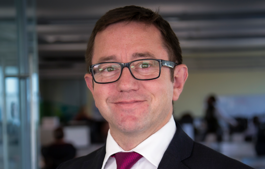Right now, the wastewater sector has a job to do when it comes to improving its carbon footprint and hitting net zero, with process emissions from sewage treatment currently accounting for around two-thirds of the total greenhouse gas output by the sector. The challenge we have is that there are no quick or easy fixes to processes which haven’t really changed in the last century. And while these processes are robust and allow for a high standard in water treatment, we are now realising how many process emissions are associated with them. Therefore, as an industry, to reach our target of being net zero by 2030, there will need to be some big changes. And these big changes are reliant on ground-breaking innovations, found not just here in the UK, but worldwide.
While there’s a lot to do in a very tight timeframe, as an engineer, the challenge of transforming wastewater treatment is particularly exciting stuff. There’s a real opportunity to revolutionise our processes and be part of significant change that will bring huge benefits to the sector, our customers, and the environment. I’ve been at Severn Trent for the last 25 years, chief engineer for 5 years; however, the business has been innovating and leading on carbon reduction for the past 60 years – it’s why I love working here. And now, I get to be a part of history, by leading on the creation of the world’s first carbon neutral wastewater treatment works. It’s an engineer’s dream. It will be housed at our new £40m net zero hub in Staffordshire, where, for the first time, we will integrate the most promising technologies from around the world on one site, with the goal of reducing and removing CO2 – eradicating 34,000 tonnes of CO2(e) per year, which is equivalent to a person flying return between London and New York, 34,500 times. This hub is a real testament to the hard work of our innovation team, as well as Severn Trent’s continued focus and investment in reaching net zero – made possible thanks to Ofwat awarding us £10m from its Innovation Fund, as well as £0.9m through Horizon Europe.
One of the first steps on our journey to creating the hub was to develop a way to monitor emissions. By working with our Net Zero partners, Melbourne Water in Australia and Aarhus Vand in Denmark, our knowledge on process emissions has evolved. Working collaboratively on methodology and the gathering of data under various conditions, led us to discover that emissions of two of the most serious of gases – methane and nitrous oxide (N2O) – were higher than we’d initially thought. This meant we had to reassess how we treat wastewater and look at ways to capture them. While challenging, this exercise was riveting as we knew this work had the potential to change practises around the world. We scaled up our investment in innovation and made excellent use of our Resource Recovery and Innovation Centre in Redditch, where we have been trialling some pioneering technologies and processes on our live systems. This is an incredible facility which allows us to bridge the gap between pilot and full-scale trials, and we typically undertake scale testing of the units at around 500,000 litres of sewage per day.
One of these processes is a technology from waste and water group SUEZ called Actilayer. It aims to tackle N2O gas emissions from activated sludge plants and significantly reduce the carbon impact associated with wastewater treatment. It does this by covering the main treatment process using active cover technology which contains a catalytic media. This is activated by sunlight and removes the nitrous oxide as it percolates through the filter of the cover. The impact of this pioneering technology cannot be overstated - it’s revolutionary. We are now planning to explore its potential on a larger scale at our hub, which by April next year will be operational and this process will be a full ‘at scale’ trial. The SUEZ Actilayer team will provide technical support, conduct additional air quality measurements and undertake robust monitoring throughout the project.
This, and other technologies we are trialling have the potential to change the face of wastewater treatment worldwide. They will not only help Severn Trent honour its environmental commitments, but the insights we gain will also help determine and present an emissions-reducing roadmap which can provide real global benefits. A blueprint that we will share with others so we can collectively achieve what’s needed together.

Bob Stear is chief engineer at Severn Trent











Water Sector Talent Exodus Could Cripple The Sector
Maybe if things are essential for the running of a country and we want to pay a fair price we should be running these utilities on a not for profit...